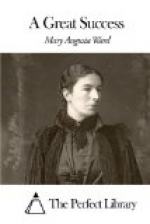During the weeks that followed the Meadowses’ first visit to Crosby Ledgers, Doris’s conscience was by no means asleep on the subject of Lady Dunstable. She felt that her behaviour in that lady’s house, and the sudden growth in her own mind of a quite unmanageable dislike, were not to be defended in one who prided herself on a general temper of coolness and common sense, who despised the rancour and whims of other women, hated scenes, and had always held jealousy to be the smallest and most degrading of passions. Why not laugh at what was odious, show oneself superior to personal slights, and enjoy what could be enjoyed? And above all, why grudge Arthur a woman friend?
None of these arguments, however, availed at all to reconcile Doris to the new intimacy growing under her eyes. The Dunstables came to town, and invitations followed. Mr. and Mrs. Meadows were asked to a large dinner-party, and Doris held her peace and went. She found herself at the end of a long table with an inarticulate schoolboy of seventeen, a ward of Lord Dunstable’s, on her left, and with an elderly colonel on her right, who, after a little cool examination of her through an eyeglass, decided to devote himself to the debutante on his other side, a Lady Rosamond, who was ready to chatter hunting and horses to him through the whole of dinner. The girl was not pretty, but she was fresh and gay, and Doris, tired with “much serving,” envied her spirits, her evident assumption that the world only existed for her to laugh and ride in, her childish unspoken claim to the best of everything—clothes, food, amusements, lovers. Doris on her side made valiant efforts with the schoolboy. She liked boys, and prided herself on getting on with them. But this specimen had no conversation—at any rate for the female sex—and apparently only an appetite. He ate steadily through the dinner, and seemed rather to resent Doris’s attempts to distract him from the task. So that presently Doris found herself reduced to long tracts of silence, when her fan was her only companion, and the watching of other people her only amusement.
Lord and Lady Dunstable faced each other at the sides of the table, which was purposely narrow, so that talk could pass across it. Lady Dunstable sat between an Ambassador and a Cabinet Minister, but Meadows was almost directly opposite to her, and it seemed to be her chief business to make him the hero of the occasion. It was she who drew him into political or literary discussion with the Cabinet Minister, so that the neighbours of each stayed their own talk to listen; she who would insist on his repeating “that story you told me at Crosby Ledgers;” who attacked him abruptly—rudely even, as she had done in the country—so that he might defend himself; and when he had slipped into all her traps one after the other, would fall back in her chair with a little satisfied smile. Doris, silent and forgotten, could not keep her eyes for long from the two distant figures—from this new Arthur, and the sallow-faced, dark-eyed witch who had waved her wand over him.




